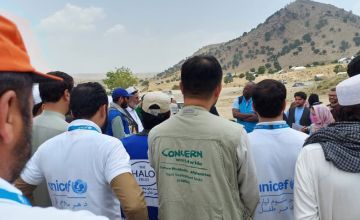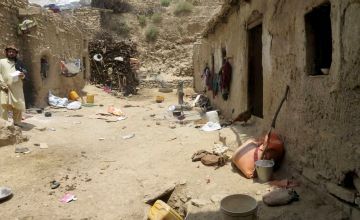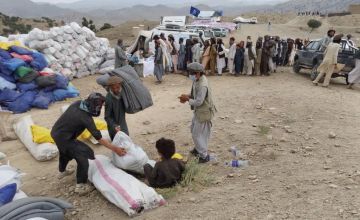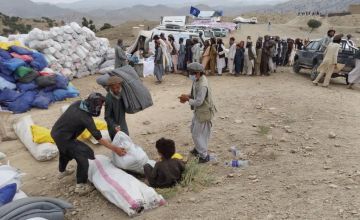
Read our 2024 annual report

Knowledge Hub
Afghanistan earthquake: The situation and our response

On 22 June 2022, a 5.9 magnitude earthquake hit South Eastern Afghanistan, killing over 1,000 people and destroying almost 5,000 homes.
At the end of June, initial estimates of 770 deaths, 1,500 injured and 1,500 shelters destroyed increased to 1,036 deaths, 3,669 injured and 4,500 homes either fully or partially destroyed. At least 155 children were killed and nearly 250 children injured. Additionally, 65 children have been orphaned or left on their own because of the tremor.
Currently, approximately 400,000 people are in need of humanitarian assistance.
The humanitarian situation

WASH
In addition to the immediate destruction of shelter and infrastructure in most affected areas, further needs are emerging regarding Water, Sanitation and Hygiene (WASH), including a high risk of widespread acute watery diarrhoea. Early reports suggest that three children have already died in the Barmal district, likely due to acute watery diarrhoea.
Future planning
Beyond providing emergency shelter to families in immediate need, preparations for winter must also begin now. Cold temperatures are often one of the biggest challenges in Afghanistan over the winter months. The country is full of mountain ranges, with much of the population living in their foothills or in the valleys below them, and winters there are extremely harsh. The onset of winter conditions is expected within the next three months, and earthquake affected districts, located in a mountainous region, are likely to be highly exposed if assistance is not provided to all households in need. Conversely, current risks of heat exposure and poor access to sanitation are current challenges facing humanitarians on the ground, including Concern staff.

Gender equality
The UN have also reported that in the wake of the earthquake, women are at risk of being left out of the humanitarian response due to restrictions on freedom of movement and presence in public spaces. This is being address in the wider humanitarian response.
Flash flooding
Following the earthquake, flash flooding affected people in multiple regions. Such incidents have increased in the past week. Since 5 July, flash floods have reportedly killed 39 people across five provinces. Nine of those killed were children. The heavy rains have also damaged or destroyed around 2,900 houses and have disrupted livelihoods. Vital infrastructure such as roads and bridges have also been impacted.
With the rains, land has slipped resulting in unexploded weaponry being transported into several villages. This risk will increase as heavy rains continue.

Concern’s response
Concern’s first response team, comprised of programme, logistics and monitoring, evaluation, accountability and learning (MEAL) staff and led by Concern’s emergency programme manager, Ros O’Sullivan, reached the earthquake zone on Thursday June 30th. The team immediately began coordinating with associates, including OCHA, other UN agencies, partner organisations and members of the de facto government.
As an initial response, Concern distributed:
- 270 non-food item kits;
- 467 dignity kits;
- 293 tents;
- 44 blankets.
These items were all from pre-positioned stocks. The kits arrived in Barmal on the morning of 5 July. The team was able to begin distribution immediately. By the end of the day, 313 households received NFIs, emergency shelter tents, and dignity kits. The remainder of the items were distributed the next day.

Concern will carry out a further assessment covering areas yet to be reached by the response in order to ensure further rounds of assistance reach those most in need, as well as to conduct technical assessments for more water systems and shelter repairs. A second team also rotated into the earthquake-affected zone on Wednesday 13th of July in order to ensure response teams do not become fatigued in the challenging environment, while also maintaining continuity and effectiveness of the response.
Find out more about our work in Afghanistan

